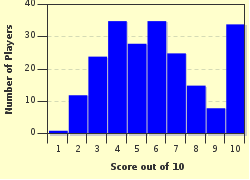Quiz Answer Key and Fun Facts
1. When was Julius Rosenberg born?
2. What was Julius Rosenberg's profession?
3. Julius Rosenberg and his wife Ethel were convicted of passing atomic secrets to the Soviet Union. How did they have access to information about the atomic bomb?
4. Harry Gold, the courier who contacted David Greenglass in New Mexico, was also the liaison man for a second, more important atomic spy. The use of the same courier for two, separate sources, eventually led to the Rosenbergs' arrest.
5. Of the three family members eventually convicted of espionage, David Greenglass was the first to be arrested. How soon after his arrest did David Greenglass confess?
6. During the course of their trial, the Rosenbergs steadfastly denied that they were members of the Communist Party. According to Sam Roberts, what was their rationale for this?
7. Who was the presiding judge at the Rosenberg trial?
8. Which of the following factors contributed to the zeal with which the Rosenbergs were prosecuted?
9. What became of the Rosenbergs' two sons, Robert and Michael, after their parents were executed?
10. The Venona papers, made public in 1994, revealed a lot about the Rosenberg case that was previously unknown. According to Sam Roberts, what conclusions can we draw about the Rosenbergs based on these papers?
Source: Author
janetgool
This quiz was reviewed by FunTrivia editor
bloomsby before going online.
Any errors found in FunTrivia content are routinely corrected through our feedback system.

